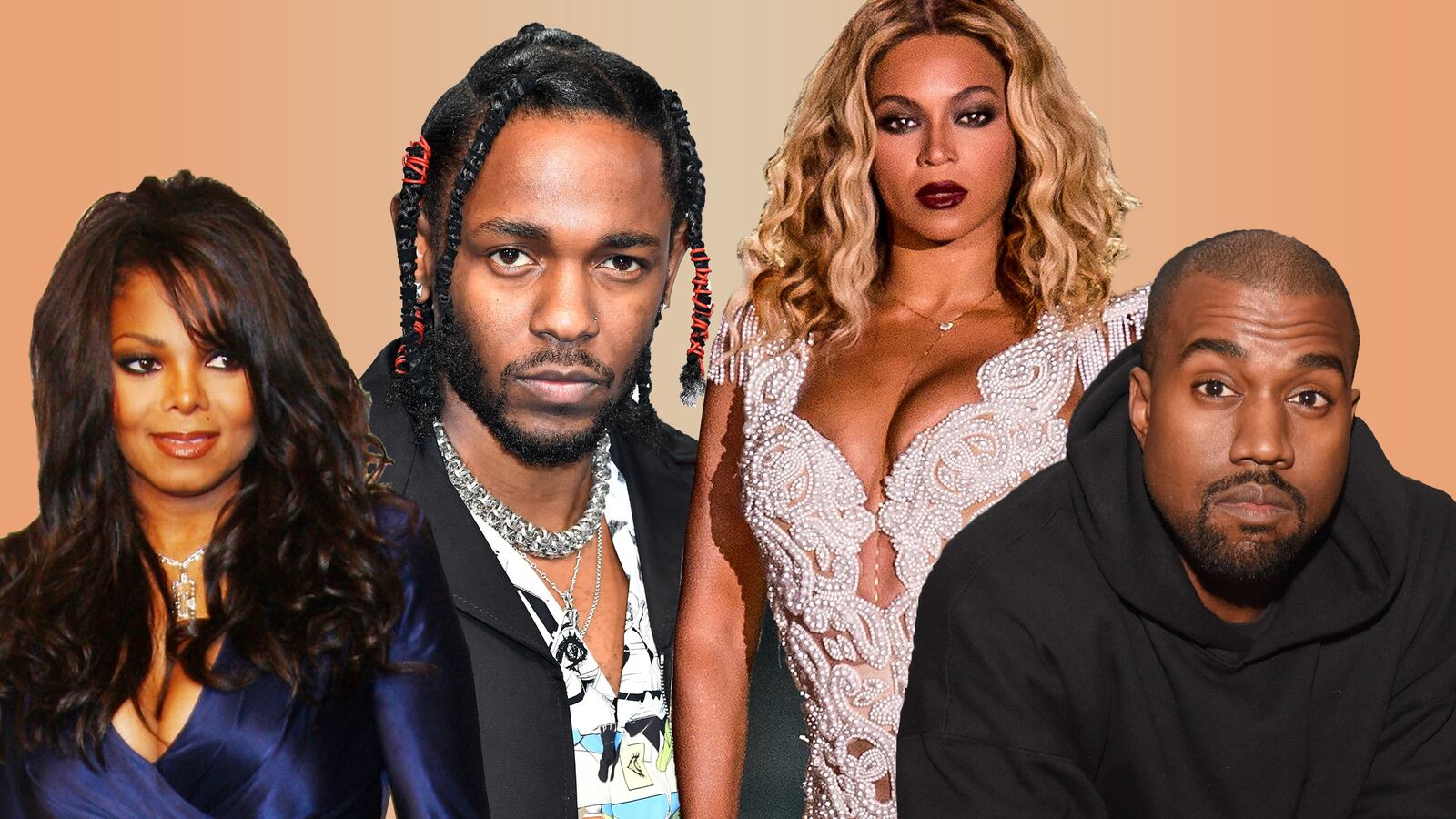Do you remember where you were the night Beyoncé dropped her self-titled album in 2013? OK, now do you remember where you were when she lost album of the year to Beck’s Morning Phase on Feb. 9? If you don’t, that’s fine, because it would happen again two years later when Beyoncé’s Lemonade lost to Adele’s 25. Both times, Beyoncé had the more critically approved album and lost out. Shocking, yes, but more common than you think.
Oftentimes, legendary albums by black artists aren’t even part of the Album of the Year nomination process. Michael Jackson’s Off the Wall wasn’t nominated. Prince’s 1999 wasn’t nominated. Janet Jackson’s Rhythm Nation wasn’t nominated. When they are nominated, they lose to albums from Mumford & Sons (Frank Ocean’s Channel Orange) and Paul Simon (Janet’s Control). It’s not merely that the Grammys diminish black artists at the top of their game, they often diminish albums that are huge cultural moments for those that are not only barely relevant today, but were hardly relevant when they were released.
Never mind the fact that rap, one of the most popular genres in music today, is constantly overlooked by The Recording Academy. The first rap album to win Album of the Year was OutKast’s Speakerboxxx/The Love Below in 2004 (Lauryn Hill’s The Miseducation of Lauryn Hill, which won in 1999, was entered as an R&B album), because white people really love the song “Hey Ya!” It overlooks the innovation that occurred in the ’90s when it comes to the genre.
Not that they get any respect in the actual Best Rap Album category either.
Barring the time he went up against Late Registration, Eminem has won Best Rap Album each year he’s been nominated, knocking out entries from Missy Elliott, Nas, Busta Rhymes, DMX, Dr. Dre, Mos Def, and Common, all of whom have never been awarded Best Rap Album. In 2014, Macklemore beat out Drake, Jay-Z, Kendrick Lamar, and Kanye West for the honor. And the fact that Missy Elliott has neither won Best Rap Album or Album of the Year is a special brand of disrespect that I don’t even have time to get into here, but it’s akin to Halle Berry being rewarded with Catwoman after winning an Oscar.
The Grammys have been lauded for this upcoming ceremony, because there are no white men nominated for Album of the Year. The nominees are: Childish Gambino’s Awaken, My Love!, Jay-Z’s 4:44, Lorde’s Melodrama, Kendrick Lamar’s DAMN, and Bruno Mars’ 24K Magic. While there’s plenty to celebrate with women getting a chance to shine as opposed to merely men, Lorde’s entry puts the win firmly in the camp of white women being honored by the industry while women of color remain largely ignored. SZA’s CTRL was a massive album that’s been sorely overlooked, but at least she’s been nominated for Best New Artist and Best Urban Contemporary Album (best album played on the negro stations, I guess, I still don’t know what the hell that category means).
White women are far more celebrated at the Grammys, and most awards shows, than women of color. When Adele won last year, she used her moment to congratulate Beyoncé on her tremendous work of art. “My artist of my life is Beyoncé,” Adele said, as she accepted the Album of the Year trophy for 25. “This album for me, the Lemonade album was so monumental, Beyoncé. So monumental, and so well thought-out and soul-bearing, and we all got to see another side to you that you don’t always let us see. And we appreciate that. All us artists here adore you. You are our light. The way you make me and my friends feel, the way you make my black friends feel, is empowering. You make them stand up for themselves. I love you, and I always will.”
In the entire history of the Grammys, only 10 black artists have won Album of the Year—Michael Jackson, Stevie Wonder, Ray Charles, Natalie Cole, Lionel Richie, Lauryn Hill, Outkast, Herbie Hancock, Whitney Houston, and Quincy Jones. Looking back on artists like Nina Simone, Janet Jackson, Prince, Missy Elliott, and more, it’s a shame that the Grammys have never honored them and their contributions to music. Even if Kendrick doesn’t win this year, with an album just as grand as To Pimp a Butterfly—which lost to Taylor Swift’s Debbie Gibson covers album, 1989—history tells us that truly great black albums remain a part of the culture they’ve influenced. Who can say that about the Grammys?






